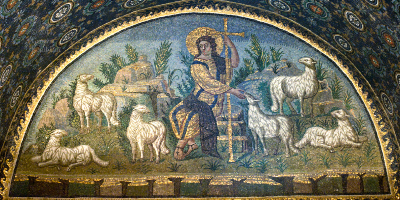Phlegon of Tralles - Olympiads (1 gen 140 anni – 31 dic 140 anni)
Descrizione:
The manuscript has been lost, but is referenced in other works:---Origen of Alexandria's Against Celsus Book II, Chap. XIV---
Celsus, however, accepting or granting that Jesus foreknew what would befall Him, might think to make light of the admission, as he did in the case of the miracles, when he alleged that they were wrought by means of sorcery; for he might say that many persons by means of divination, either by auspices, or auguries, or sacrifices, or nativities, have come to the knowledge of what was to happen. But this concession he would not make, as being too great a one; and although he somehow granted that Jesus worked miracles, he thought to weaken the force of this by the charge of sorcery. Now Phlegon, in the thirteenth or fourteenth book, I think, of his Chronicles, not only ascribed to Jesus a knowledge of future events (although falling into confusion about some things which refer to Peter, as if they referred to Jesus), but also testified that the result corresponded to His predictions. So that he also, by these very admissions regarding foreknowledge, as if against his will, expressed his opinion that the doctrines taught by the fathers of our system were not devoid of divine power.
---Eusebius' Chronicle Book 2, cited by Jerome---
Jesus Christ, according to the prophecies, which had been spoken about him beforehand, came to the Passion in the 18th year of Tiberius, at which time also we find these things written verbatim in other commentaries of the gentiles: an eclipse of the sun happened 1, Bithynia shaken by earthquake, and in the city of Nicaea many buildings collapsed: all of which agree with what occurred in the Passion of the Saviour. Indeed Phlegon, who is an excellent calculator of olympiads, also writes about this, in his 13th book writing thus:
"However in the fourth year of the 202nd olympiad, an eclipse of the sun happened, greater and more excellent than any that had happened before it; at the sixth hour, day turned into dark night, so that the stars were seen in the sky, and an earthquake in Bithynia toppled many buildings of the city of Nicaea." These things the aforementioned man (says).
The proof however of this matter, that in this year the Saviour suffered, the gospel of John presents, in which it is written that after the 15th year of Tiberius Caesar, the Lord preached for three years. Also Josephus, a native writer of the Jews, attests that around that time on the day of Pentecost, the priests first perceived an earth tremor and certain (loud) sounds. Then, that an unexpected voice suddenly burst out from the innermost part of the Temple saying: "Let us flee from this abode." However the aforementioned man writes that in the same year Pilate the governor secretly in the night set up images of Caesar in the temple, and from this arose the first cause of the rebellion and turmoil of the Jews.
--- George Syncellus, Chronicle of Theophanes, citing the Chronographiai of Sextus Julius Africanus---
On the whole world there pressed a most fearful darkness; and the rocks were rent by an earthquake, and many places in Judea and other districts were thrown down. This darkness Thallus, in the third book of his History, calls, as appears to me without reason, an eclipse of the sun. For the Hebrews celebrate the passover on the 14th day according to the moon, and the passion of our Saviour falls on the day before the passover; but an eclipse of the sun takes place only when the moon comes under the sun. And it cannot happen at any other time but in the interval between the first day of the new moon and the last of the old, that is, at their junction: how then should an eclipse be supposed to happen when the moon is almost diametrically opposite the sun? Let that opinion pass however; let it carry the majority with it; and let this portent of the world be deemed an eclipse of the sun, like others a portent only to the eye. Phlegon records that, in the time of Tiberius Caesar, at full moon, there was a full eclipse of the sun from the sixth hour to the ninth — manifestly that one of which we speak. But what has an eclipse in common with an earthquake, the rending rocks, and the resurrection of the dead, and so great a perturbation throughout the universe? Surely no such event as this is recorded for a long period. But it was a darkness induced by God, because the Lord happened then to suffer. And calculation makes out that the period of 70 weeks, as noted in Daniel, is completed at this time.
Aggiunto al nastro di tempo:
Data:
1 gen 140 anni
31 dic 140 anni
~ 12 months
